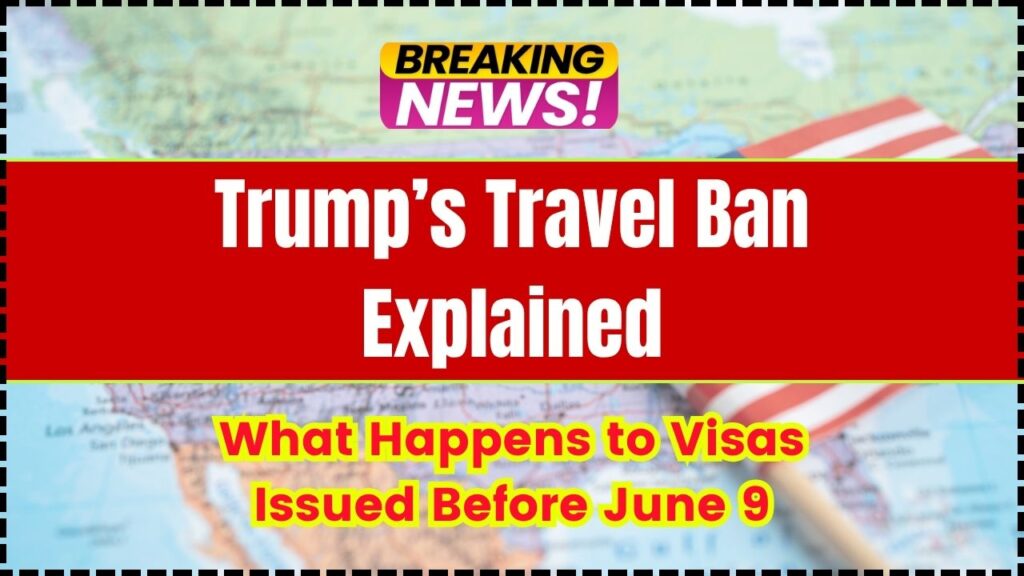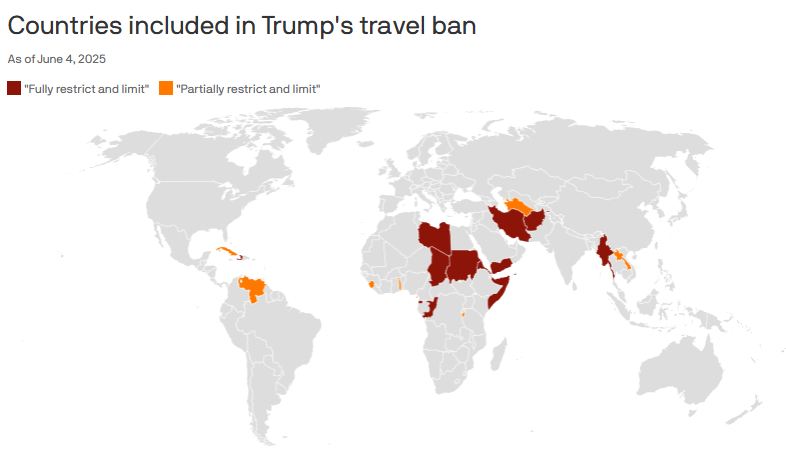
Trump’s Travel Ban Explained: In June 2025, former President Donald Trump’s administration announced a renewed version of its travel ban that affects nationals from 19 countries. This updated version of the ban has led to confusion, uncertainty, and plenty of questions regarding how it affects visas, travelers, and their rights. Whether you’re looking to travel to the United States, are concerned about the status of your current visa, or want to know if you or your family members are exempt from the restrictions, this article will break down the details. Let’s go over the main points you need to know.
Trump’s Travel Ban Explained
Navigating the complexities of the U.S. travel ban can be overwhelming, but with the right information and preparation, you can ensure a smoother journey. Whether you’re an athlete heading to the U.S. for a major event or a family member trying to reunite with loved ones, knowing the details of the ban, understanding the exemptions, and preparing the necessary documentation are key to avoiding any disruptions in your travel plans. Make sure to stay updated with the latest information from reliable sources like the U.S. Department of State and the White House, as the situation could evolve further. The best thing you can do is stay informed, plan ahead, and, if needed, seek professional legal assistance to protect your rights and ensure you can successfully travel to the U.S.
| Topic | Details |
|---|---|
| Effective Date | June 9, 2025, 12:01 AM EDT |
| Visas Issued Before June 9, 2025 | Remain valid unless revoked for other reasons |
| Exemptions | Includes lawful permanent residents, dual nationals, diplomats, athletes, and more |
| Countries Affected | 19 countries, including Iran, Somalia, Yemen, and others |
| Special Categories Exempt from Ban | Immediate family members of U.S. citizens, athletes, certain refugees |
| Official Reference | White House Official Announcement |
Trump’s Travel Ban Explained
To set the stage, let’s talk about what the travel ban actually entails. The first version of the travel ban was introduced in 2017 by former President Donald Trump as a measure to prevent nationals from certain countries from entering the U.S. The main reason behind the ban was national security concerns, particularly regarding terrorism. The ban was modified and challenged in courts multiple times before the new changes were announced in June 2025.
The updated ban has a more targeted focus. It restricts the entry of nationals from 19 countries, with full or partial restrictions on various visa categories. This is part of the ongoing effort by the Trump administration to manage U.S. immigration policy with a focus on safety and national security.
What Happens to Visas Issued Before June 9, 2025?
If you already have a valid visa issued before June 9, 2025, it remains in effect. This means that you can still use your visa to travel to the U.S., unless there’s another legal reason for it to be revoked. For instance, if there are outstanding issues with your visa or if it’s expired, you would need to go through the renewal process. The key takeaway here is that your visa won’t be automatically canceled or invalidated because of the ban. However, be prepared for possible extra scrutiny at the border, especially if you’re from one of the banned countries.
If you’re unsure whether your visa qualifies for travel, it’s best to double-check with the U.S. embassy or consulate in your home country. They will provide the most accurate and up-to-date information regarding your visa status.
Who Is Exempt from the Travel Ban?
While the ban may seem all-encompassing, it includes several exemptions to ensure that certain individuals can still travel to the U.S. Here’s a more detailed breakdown of who qualifies for these exemptions:
1. Lawful Permanent Residents (Green Card Holders)
If you’re a lawful permanent resident (LPR) or green card holder, you’re exempt from the ban. Even if you’re from a country on the restricted list, you are allowed to travel back to the U.S. without the travel ban affecting your entry. So, if you’re a green card holder, you don’t have to worry about the restrictions that may affect other travelers.
2. Dual Nationals
Dual nationals (people holding citizenship from both a banned country and a non-banned country) are not subject to the restrictions. For example, if you’re an Iranian citizen but also have French citizenship, you will be exempt from the travel ban and can travel to the U.S. using your French passport.
3. Diplomats and International Representatives
Diplomatic and official visas, including those issued to employees of international organizations like the UN, are exempt from the ban. This ensures that international relations and diplomacy continue to function without disruption.
4. Athletes and Support Staff
One notable exception includes athletes traveling to participate in major sporting events such as the 2025 Club World Cup, the 2026 FIFA World Cup, and the 2028 Olympics. These individuals and their immediate family members are allowed to enter the U.S., provided they meet the necessary requirements for entry.
5. Immediate Family Members of U.S. Citizens
The U.S. understands the importance of family reunification. Immediate family members, including spouses and minor children of U.S. citizens and green card holders, are exempt from the travel ban. It’s crucial to have proper documentation, such as marriage and birth certificates, when entering the U.S. as a family member of a U.S. citizen.
6. Special Immigrant Visas (SIVs) for Certain Nationals
If you’re an Afghan national who assisted U.S. forces and was granted a Special Immigrant Visa (SIV), you are exempt from the ban. This is part of the U.S. government’s commitment to those who risked their lives to support American military and humanitarian efforts.
7. Refugees and Asylees
Individuals already granted refugee or asylum status in the U.S. are not affected by the travel ban. If you are seeking refuge or have already been granted asylum in the U.S., the ban does not apply to you.
8. Adoptive Children
Children who are being adopted into U.S. families are also exempt from the ban. The U.S. prioritizes the welfare of children, so these cases are treated separately to ensure the adoption process continues smoothly.

Practical Advice for Travelers Affected by the Ban
If you’re from one of the countries on the list, you might be wondering how to navigate this situation. Here are some actionable tips to help you prepare for travel under the new restrictions:
1. Check Your Visa Status
The first thing you should do is check your visa status. If you’ve already been issued a visa before June 9, 2025, it should still be valid unless there are other issues. You can visit the U.S. embassy website for your country or contact the embassy directly for more specific advice on how the travel ban affects your situation.
2. Keep Documentation Handy
If you are exempt from the ban (e.g., you’re a green card holder or immediate family member of a U.S. citizen), make sure to carry all necessary documentation to prove your exemption. This includes things like your marriage certificate, birth certificate, or evidence of your permanent resident status.
3. Be Prepared for Extra Screening
Even if you’re exempt from the travel ban, expect additional screening and questioning at U.S. ports of entry. This could involve interviews or providing extra proof of your eligibility to enter. It’s important to remain patient and cooperative during the process.
4. Seek Legal Assistance
If you’re facing difficulties with your visa or entry into the U.S., consulting with an immigration attorney can be invaluable. They can guide you through the process and help ensure your rights are protected.
Harvard Commencement Held Under Fire: Trump Cuts Funding, International Students on Edge
Trump Confirms Elon Musk’s Exit: Special Conference to Address Shocking Cabinet Departure











